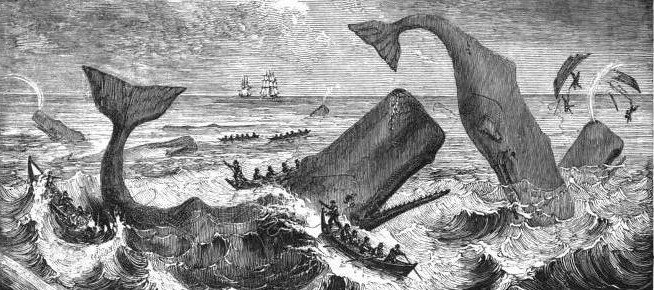Bacharach, Samuel. “Your Own Private Whale: Leadership Lessons From Moby-Dick.” Inc. (November 2012)
Brenner, Michael. “America’s Moby Dick.” The Huffington Post (July 29, 2013).
Brown, Alistair. “The Significance of the Narrator in Moby-Dick.” The Pequod (2003).
Dagovitz, Alan. “Moby-Dick‘s Hidden Philosopher: A Second Look at Stubb.” Philosophy and Literature, 32.2 (2008) pp. 330 – 346.
Dexter, Gary. How Moby Dick Got His Name from Why Not Catch 21?: The Stories Behind the Titles (2007). via Power Moby-Dick.
Epstein, Charlotte. “Moby Dick or Moby Doll? Discourse, or How to Study the ‘Social Construction of’ All the Way Down.” Constructing the International Economy. Rawi Abdelal, Mark Blyth, and Craig Parsons, eds. (2010), pp. 175-193.
Fassler, Joe. “The Endless Depths of Moby-Dick Symbolism” The Atlantic (August 20, 2013).
Greiman, Jennifer. “Circles upon Circles: Tautology, Form, and the Shape of Democracy in Tocqueville and Melville.” J19: The Journal of Nineteenth-Century Americanists, 1.1 (Spring 2013).
Giraldi, William. “The Writer as Reader: Melville and his Marginalia” Los Angeles Review of Books (August 2013).
Hedges, Chris. “We are all Aboard the Pequod..” truthdig.com (July 7, 2013).
Hertzberg, Hendrik. “Melville on Income Inequality.” The New Yorker (September 4, 2013).
McWilliams, Susan. “Ahab, American.” The Review of Politics, 74.2 (2012), p. 233.
Murnighan, Jack. How to Love Moby-Dick from Beowulf on the Beach: What to Love and What to Skip in Literature’s 50 Greatest Hits (2009). via Power Moby-Dick.
Nesmith, Jane. “Missing Moby Dick.” Writer’s Notebook (February 5, 2013).
Osherenko, Gail. “Environmental Justice and the International Whaling Commission: Moby-Dick Revisited.” Journal of International Wildlife Law & Policy, 8.2-3 (September 2005), pp. 221-239.
Parsons, Amy. “‘A Careful Disorderliness’: Transnational Labors in Melville’s Moby-Dick.” ESQ: A Journal of the American Renaissance, 58.1 (2012) pp. 71-101.
Philbrick, Nathaniel. “The Road to Melville.” Vanity Fair (November 2011).
Routledge, Chris. Review: Moby-Dick (Penguin: 2003).
Saiki, Ikuno. “A Shadow of the Far East: Fedallah; or, a Japanese Sea Drifter.” Leviathan, 8.3 (Oct 2006) pp. 33-42.
Sanborn, Geoffrey. “How to read Moby-Dick by Herman Melville.” O, The Oprah Magazine (July 2006).
Schillace, Brandy. “A Man’s Soul and a Fish’s Scale: Sex, Size and Spirit in Moby Dick.” Journal of Men, Masculinities and Spirituality, 6.2 (2012) pp. 94-105.
Schmidt, Ben. “Reading digital sources: a case study in ship’s logs.” Introduction to a series on whaling logs and digital history composed for the blog Sapping Attention: Digital Humanities: Using tools from the 1990s to answer questions from the 1960s about 19th century America.
Sepahvand, Hajiali. “Decolonization in Herman Melville’s Moby Dick.” Theory and Practice in Language Studies, 2.4 (April 2012), p. 831.
—————. “Hybridity as Instrument of Decolonization in Herman Melville’s Moby Dick.” Theory and Practice in Language Studies, 2.5 (May 2012), p. 895.
Schultz, Elizabeth. “The New Art of Moby-Dick.” Leviathan, 21.1 (2019), pp. 7-96.
—————. “‘The Common Continent of Men’: Visualizing Race in Moby-Dick.” Leviathan, 3.2 (October 2001), pp. 19-34.
Steinwand, Jonathan. “What the Whales Would Tell Us: Cetacean Communication in Novels by Witi Ihimaera, Linda Hogan, Zakes Mda, and Amitav Ghosh.” Postcolonial Ecologies: Literatures of the Environment. Elizabeth M. DeLoughrey and George B. Handley (2011), pp. 182-199.
Stott, Rebecca. “Moby-Dick: Into the Wonder-World, Audaciously” NPR (June 13, 2007).
Taylor, Christopher. “The Limbs of Empire: Ahab, Santa Anna, and Moby-Dick.” American Literature, 83.1 (March 2011), pp. 29-57.
Yang, Jincai. “The Critical Reception of Herman Melville in China.” Leviathan, 14.2. (June 2012), pp. 54-67.
Zimmer, Carl. “‘Therefore his shipmates called him mad’: The Science of Moby Dick” What Ever Happened to Moby Dick? (2013).
